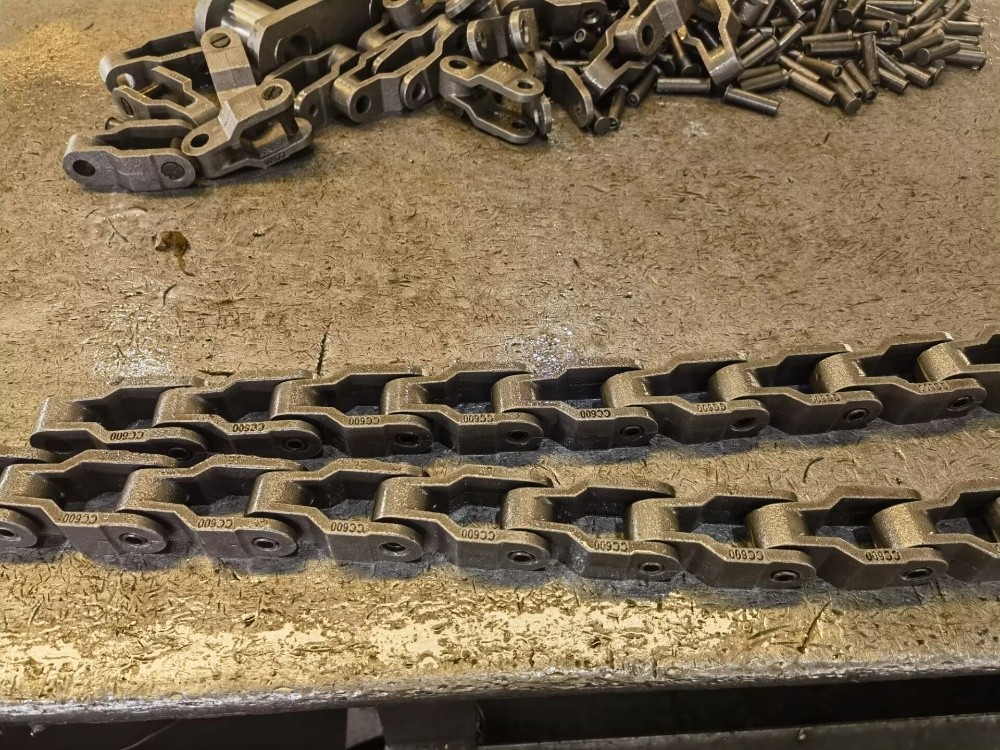Intelligent Upgrades Propel Innovation in the Conveyor Chain Industry
Green Manufacturing and Efficient Logistics Emerge as Core Development Trends
Introduction
Amid the global push for industrial automation and the pursuit of dual carbon goals, conveyor chains—critical components in production and logistics systems—are undergoing a transformative upgrade. These systems are moving beyond their traditional roles, entering a new era defined by intelligence, sustainability, and cross-sector applications. Leading international manufacturers are redefining conveyor chain capabilities with innovative, lightweight, and eco-conscious designs that are driving both market expansion and technological progress.
I. Technological Advancements: From Mechanical Transmission to Intelligent Perception
Conventional conveyor chains have long suffered from issues like high wear and frequent maintenance. The recent launch of the iChain 4.0 series by Germany’s Bosch Group represents a pivotal shift. Equipped with integrated micro-sensors and IoT modules, this smart chain can monitor tension, temperature, and wear in real-time, and predict potential failures through cloud-based analytics. This predictive maintenance capability reduces unplanned downtime by up to 60%.
"Intelligent chains are no longer passive mechanical components, but active data nodes within the industrial internet," said a Bosch industrial technology spokesperson. The iChain system is now deployed in several major automotive production lines, including Tesla’s Berlin factory, where it has helped boost assembly efficiency by 18%.
II. Expanding Applications: Cross-Industry Integration Drives Demand
Conveyor chain applications are expanding beyond traditional manufacturing, creating new demand in emerging sectors:
Cold Chain Logistics: Japan’s Tsubaki Chain has developed a corrosion-resistant chain for environments as cold as -50°C, addressing issues of condensate corrosion in refrigerated transport. Major logistics firms like JD Logistics and SF Cold Chain have adopted it, significantly improving equipment reliability.
New Energy Sector: The Beijing Institute of Machinery Industry Automation (BIAI) has tailored anti-static conveyor systems for photovoltaic panel production, minimizing micro-dust contamination and achieving a product pass rate of 99.3%.
Smart Agriculture: Dutch company Van der Graaf has introduced a food-grade, self-lubricating conveyor chain for unmanned sorting facilities. Certified under EU EC1935 food safety standards, the product has seen a 45% year-on-year export increase.
III. Green Transformation: Embracing Low-Carbon Materials and Circular Economy Principles
As carbon regulations tighten and ESG investment rises, the conveyor chain industry is accelerating its shift toward sustainability:
Material Innovation: Sweden’s SKF Group has introduced a “zero-carbon chain” using recycled steel and bio-based lubricants, slashing carbon emissions by 70% per production line.
Process Innovation: China’s Greatoo Intelligent Equipment has pioneered laser cladding remanufacturing technology, reducing repair costs to just 30% of a new chain while extending service life by 1.5 times.
Standardization Efforts: The International Organization for Standardization (ISO) plans to release a guide in 2024 titled “Calculation Method for Carbon Emissions Across the Full Lifecycle of Conveyor Chains”, aiming to establish global carbon footprint benchmarks.
IV. Market Outlook: A Shifting Global Competitive Landscape
According to Global Market Insights, the conveyor chain market surpassed $12 billion USD in 2023, with a projected CAGR of 6.5% through 2030. The Asia-Pacific region currently holds 45% of the global market share. Chinese companies such as Hangzhou Donghua and Qingdao Choho are gaining traction in Southeast Asia and the Middle East by offering high performance at competitive prices. Meanwhile, Western companies are focusing on premium solutions. For example, Rexnord (USA) has developed aerospace-grade titanium alloy chains capable of supporting over 10 tons per meter, commanding a 200% premium in high-demand applications.
Expert Insight
“The next five years will see polarization in the conveyor chain industry,” notes Zhang Lixian, Secretary-General of the Chain Transmission Branch, China General Parts and Components Industry Association. “High-end markets will compete on intelligence and materials innovation, while the mid- and low-end segments must focus on green manufacturing and large-scale cost optimization.”
Conclusion
From smart factories to automated warehouses, from cold-chain logistics to aerospace facilities, conveyor chains are undergoing a revolution that mirrors the broader transformation of global industry. With the integration of AI, advanced materials, and sustainable practices, these systems—once considered simple mechanical components—are now at the forefront of industrial innovation and environmental responsibility.
GIDI CHAIN LIMITED supply lots of roller chain, conveyor chain, Leaf Chain, welded chain, forged chain, Palm Oil Mill Chain, Hoisting Chain,Mine and Metallurgy Chain, etc. totaling over 3000 varieties. and 90% of chains are exported to worldwide, Which mainly export to Southeast Asia, European, North America, South America. Chains are welcomed by customers with the excellent quality. Our company owns more than 100 sets of advanced and professional manufacturing equipment, Perfect and rigorous QC system is implemented in every process from material purchasing to finished products packaging. Also, we have passed the ISO9001: 2015 Quality Management System Certification.
More Detail : www.gidi-chain.com
